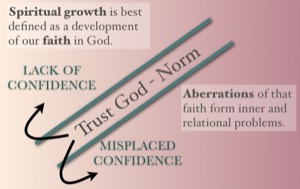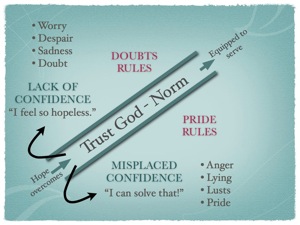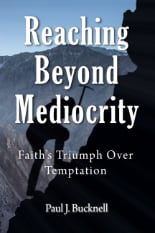

Discovering Choices: Lesson #2
Discipleship Level 2: Reaching Beyond Mediocrity
Paul J. Bucknell
Choices | Battlefield | Evaluation | Path of Life | 3 Choices
![]()
Purpose: Three Choices, the fifth part of the second lesson in the Discipleship 2: Reaching Beyond Mediocrity series, presents the three choices that we choose in any given situation and how our choices reveal what we really believe.
Three Choices
Now let us more clearly categorize what we have just mentioned. As we discuss this overview, three choices will be presented. More than often we are not aware of any of the choices we have made or the ones before us. We need to sharpen our minds.
 Again, please remember that we are learning these things not only to help us but also to minister to others. Learn them from an individual perspective but also an outward one. As God teaches and helps us, we can begin to help others.
Again, please remember that we are learning these things not only to help us but also to minister to others. Learn them from an individual perspective but also an outward one. As God teaches and helps us, we can begin to help others.
Choice #1) God-focused confidence
Trusting God is the right way that brings great reward. This is choice #1 and is written all over the scriptures in all sorts of ways. "How blessed is the man who has made the LORD his trust, and has not turned to the proud, nor to those who lapse into falsehood." (Psalms 40:4). Our problems occur when we actually stop doing what God wants. That is where our problems start.
As I have studied the scriptures, the Lord has helped me to see that there are two major categories for our problems. They both relate to how we do not properly respond to the Lord. We doubt what the Lord says. We do not believe it is best. We think other ways will work better. On and on goes our many attempts to live in rejection of God's power in our lives. These wrong approaches are aberrations of the faith we are supposed to have in the Lord. They are what I call misplaced confidence and the lack of confidence.
Choice #2) Misplaced Confidence
Misplaced confidence (choice #2) describes those who have confidence, but it is in the wrong object. They do not trust in God. They believe other things will help them reach their goals. Here is a an example from the scriptures.
"And a woman who had had a hemorrhage for twelve years, and had endured much at the hands of many physicians, and had spent all that she had and was not helped at all, but rather had grown worse, after hearing about Jesus, came up in the crowd behind Him, and touched His cloak. For she thought, "If I just touch His garments, I shall get well."" (Mark 5:25-28).
What do you notice about this woman? She, and who blames her, tried many a doctor. She would put her confidence in a certain doctor and be willing to give him money. She was not healed and probably quite sad. Then she heard of another doctor and paid him too, but that did not work either. Her persistent bleeding which kept her impure and shunned by others, kept prompting her to find a solution to her problem.
Each time she got enough confidence to where she again would be willing to trust her money and life in the hands of these many physicians even though she found her hopes to be false in the past. (Please note we are not stating that one should avoid doctors but simply see this as an example of the way a person puts his or her trust in things even when they fail).
 We see this pattern all over the scriptures. Man trusts in his own devices rather than in the power and ways of God.
We see this pattern all over the scriptures. Man trusts in his own devices rather than in the power and ways of God.
"Behold, I have found only this, that God made men upright, but they have sought out many devices" (Ecclesiastes 7:29).
"The statutes of Omri And all the works of the house of Ahab are observed; And in their devices you walk. Therefore, I will give you up for destruction And your inhabitants for derision, And you will bear the reproach of My people" (Micah 6:16).
"Do not grant, O LORD, the desires of the wicked; Do not promote his evil device, lest they be exalted. Selah" (Psalms 140:8).
This word for device is the same word for invention. They have invented things upon which they put their trust. This misplaced trust means they believe by doing such and such that they can obtain their goals. This is true for the man who puts his trust in his wealth to protect his life or the man who goes from idol to idol with an offering, hoping that a certain god or goddess will help him in his grades. This misplaced confidence is the common thread in these areas.
So how does it work in daily life? Lots of ways. We see many illustrations from the scriptures.
Deceit - Abraham deceived others about Sarah only being his sister. He was trying to protect his own things. He did not trust God but trusted his deceptive ways.
Foolish decisions - Joshua sent men to battle without prayer at Ai and without consulting God made an agreement with the Gibeonites. Joshua put his confidence in his cleverness, experience and resources (soldiers) rather than on God.
Legalists put their trust on their righteous deeds rather than admitting their sin, confessing their need for Christ and His righteousness.
People trust in money to protect them. "A rich man's wealth is his strong city, and like a high wall in his own imagination." (Proverbs 18:11).
Choice #3) Lack of Confidence
The lack of confidence (choice #3) describes that third group of behaviors or attitudes which are depicted by a loss of confidence. This is often a temporary situation compared to those who have a misplaced confidence.
When people lack confidence that they will have money, or that someone loves them, or that they will not be protected, they begin to be crippled in their persons. Something is not working right. Faith and confidence is taken away from them, and they sense that they are out of control, defeated, trapped and lonely. They do not know where to turn.
Confidence is normal. God made us to function that way. When our hopes fail, however, then we no longer can rely on our 'normal' solutions and often panic. This is true for those who lost faith in God or in their idols. This is a very dangerous stage because a person might cling to any hope they can find, whether it be a business opportunity, religion or new girlfriend.
Once they have lost confidence, their hope is depleted. No one likes this state of hopelessness. They are desperate to search for more hope. In this sense, this stage is often temporary or short-lived.
Satan wants to hurt, steal and destroy. "The thief comes only to steal, and kill, and destroy; I came that they might have life, and might have it abundantly" (John 10:10). By having hope ripped from their lives, people are ready to commit suicide. Many do. These individuals have lost all hope and without that hope, do not dare live on.
Before they are totally trapped, however, they try everything they can to find hope.  These same people are the individuals who go on shopping sprees, gambling binges, drug sniffing, etc. They are searching for different things.
These same people are the individuals who go on shopping sprees, gambling binges, drug sniffing, etc. They are searching for different things.
They bounce back and forth trying to regain their confidence. Unfortunately, many are like that woman in the scriptures who tried everything at a great price. Fortunately, she finally found Jesus and He healed her. Those in this stage are much more willing to hear about Jesus than those with confidence in their own ways.
Summary
 Misplaced confidence is very much like false hope described in the first lesson. Hope is good and necessary for a well-balanced life. From it springs motivation, adventure, risk and endurance. But if our hope is focused on the wrong thing, then we will end up with something worse than the first. We will align our lives and resources to gain what we think is so important.
Misplaced confidence is very much like false hope described in the first lesson. Hope is good and necessary for a well-balanced life. From it springs motivation, adventure, risk and endurance. But if our hope is focused on the wrong thing, then we will end up with something worse than the first. We will align our lives and resources to gain what we think is so important.
That woman endured much at the hands of many physicians. Finally she found hope in Jesus when she put her trust in Him. Jesus will never fail us.
God made us so that we would walk in faith in His ways. When we lack that sense of confidence, we then become troubled. Psychiatrists call those so troubled as having mental disorders. These individuals cannot rightly discern matters.
-> Continue on reading part 6/6: Sharpening the Mind
Reaching Beyond Mediocrity (Click here)
Discipleship at the 2nd level
by Paul J. Bucknell
Discipleship at the 2nd level
by Paul J. Bucknell
God's Word comes alive as you learn how to use it to overcome personal struggles like anxiety, depression, pride, lust and anger. God has made you strong! Many worksheets! (300+ pages). This is the full resource with all the complete and updated pages included!
info@foundationsforfreedom.net
Scriptures typically quoted from the New American Standard Bible unless noted:
(C) Copyright The Lockman Foundation 1988










